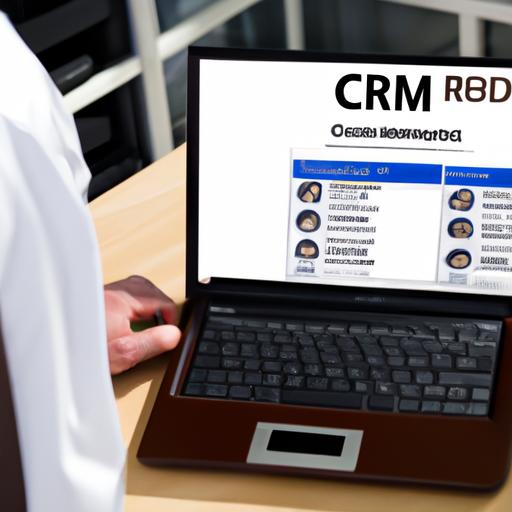Understanding the Sales Process

Sales representative utilizing CRM software for effective deal management
As a salesperson, you know that closing a deal takes more than just a persuasive pitch. It’s a complex process that involves various stages, each with its own unique challenges. Understanding this process is essential for any sales team looking to increase their success rate.
The Different Stages of the Sales Process
The sales process typically consists of six stages: prospecting, qualifying, needs assessment, presentation, handling objections, and closing. In the prospecting stage, sales teams identify potential customers and begin building a relationship with them. Qualifying involves determining if the potential customer is a good fit for the product or service being offered. Needs assessment is where sales teams identify the customer’s specific needs and how the product or service can meet those needs.
The presentation stage is where sales teams make their pitch, highlighting the benefits of the product or service. Handling objections is an essential part of the sales process, where sales teams address any concerns or hesitations the customer may have. Finally, in the closing stage, the sales team secures the deal by getting the customer to agree to purchase the product or service.
Importance of Tracking Customer Interactions
Tracking customer interactions is a crucial part of the sales process. It allows sales teams to identify potential customers, track their progress through the sales process, and analyze their behavior to optimize future interactions. CRM tools are invaluable in this regard, providing a centralized location to store and manage customer information, including communication history, purchase history, and preferences.
By tracking customer interactions, sales teams can personalize their approach, providing a more tailored experience for each customer. Furthermore, it ensures that no opportunity is missed, allowing sales teams to follow up with leads and customers in a timely and effective manner. Overall, understanding the sales process and the importance of tracking customer interactions is vital for any sales team looking to close more deals.
CRM Features That Help Sales Teams

Sales team celebrating successful deal closure with CRM support
As a sales team, your ultimate goal is to close more deals efficiently and effectively. A CRM system can help you achieve that by providing features that streamline your sales process, ultimately saving you time and resources.
Overview of the various features of CRM that can help sales teams
One of the essential features of a CRM system is its ability to store customer data. By keeping track of customer interactions, sales teams can access valuable information that can help them understand their customer’s needs and preferences better. Another feature that can help sales teams is the ability to manage leads. With a CRM system, sales teams can track leads from start to finish, ensuring that no potential customers fall through the cracks.
CRM systems also provide sales teams with tools to automate tasks such as sending follow-up emails and scheduling appointments. This automation can save sales teams a considerable amount of time, allowing them to focus on more critical tasks, such as closing deals. Additionally, CRM systems can provide sales teams with real-time data and analytics that can help them make informed decisions.
How these features can streamline the sales process
By using a CRM system, sales teams can streamline their sales process significantly. With all the essential customer data stored in one central location, sales teams can access the information they need to close deals quickly. Tools such as automated follow-up emails and appointment scheduling can help sales teams stay on top of their tasks, ensuring that no leads fall through the cracks.
Moreover, with the ability to track leads from start to finish, sales teams can identify bottlenecks in their sales process and make the necessary adjustments. Finally, with access to real-time data and analytics, sales teams can make informed decisions that can help them close more deals.
In conclusion, the various features of a CRM system can help sales teams streamline their sales process, ultimately helping them close more deals efficiently and effectively. By providing tools to store customer data, manage leads, automate tasks, and provide real-time data and analytics, CRM systems can significantly benefit sales teams.
Benefits of Using CRM for Sales Teams

Sales manager analyzing sales data through CRM software on tablet device
As a sales professional, you’re always looking for ways to increase productivity and improve customer relationships. Implementing a customer relationship management (CRM) system can help you achieve both of these goals. In fact, using a CRM system can benefit your sales team in several ways.
Increased Productivity and Efficiency
One of the most significant benefits of using a CRM system is that it can increase productivity and efficiency. With a CRM system, you can automate many of the time-consuming tasks associated with managing customer relationships. For example, a CRM system can automatically log customer interactions, track sales leads, and schedule appointments. This automation frees up your time, allowing you to focus on more important tasks, like closing deals.
Improved Customer Relationships
Another benefit of using a CRM system is that it can help you build stronger relationships with your customers. By tracking customer interactions, you can gain valuable insights into your customers’ needs, preferences, and pain points. With this information, you can provide personalized service and tailor your sales approach to meet their individual needs. Additionally, a CRM system can help you identify cross-selling and upselling opportunities, which can lead to increased revenue.
Enhanced Sales Forecasting and Reporting
Finally, using a CRM system can help you improve your sales forecasting and reporting. By tracking sales leads and customer interactions, you can gain a better understanding of your sales pipeline and identify potential roadblocks. With this information, you can make data-driven decisions about your sales strategy and adjust your approach as needed. Additionally, a CRM system can generate detailed reports on sales activity, providing you with insights into your team’s performance and identifying areas for improvement.
Overall, using a CRM system can provide numerous benefits for your sales team. By increasing productivity, improving customer relationships, and enhancing sales forecasting and reporting, a CRM system can help you close more deals and achieve greater success.
Implementing CRM for Your Sales Team
Implementing a CRM system can be a game-changer for your sales team, but it’s crucial to do it right. Here are some steps to take when implementing CRM for your sales team:
Steps to take when implementing CRM for your sales team
-
Define your objectives: Start by determining what you hope to achieve with your CRM system. Perhaps you want to improve lead generation or increase customer retention rates. Whatever your goals, make sure they’re specific, measurable, and achievable.
-
Choose the right CRM software: There are many CRM software options available, each with its own strengths and weaknesses. Consider factors such as price, ease of use, customization options, and compatibility with your existing systems when making your choice.
-
Get buy-in from your team: It’s important to get buy-in from your sales team early on. Explain the benefits of the new system and how it will make their jobs easier. Involve them in the decision-making process and make sure they understand how to use the new system.
-
Train your team: Once you’ve chosen your CRM software, make sure your sales team is properly trained on how to use it. Consider providing training sessions or tutorials and ensure that everyone understands the system’s features and how to access customer data.
Common challenges and how to overcome them
Implementing a CRM system can be challenging, but being aware of common pitfalls can help you avoid them. Here are some common challenges and how to overcome them:
-
Resistance to change: Some team members may be resistant to change, particularly if they’re used to using manual processes or a different CRM system. To overcome this, involve your team in the decision-making process and provide training and support.
-
Poor data quality: Your CRM system is only as good as the data you put into it. Make sure your team understands the importance of accurate and up-to-date data and put processes in place to ensure data quality.
-
Underutilization: It’s important to make the most of your CRM system’s features to get the best results. Encourage your team to explore the system’s capabilities and provide ongoing training and support to ensure they’re using it to its full potential.
By following these steps and being aware of common challenges, you can successfully implement a CRM system that helps your sales team close more deals and achieve your business objectives.
Conclusion
In conclusion, it is evident that CRM can significantly impact your sales team’s performance and lead to increased revenue. By providing a centralized platform to manage customer interactions, companies can streamline their sales processes and provide personalized experiences for customers.
The benefits of using CRM for sales teams are numerous, including increased productivity, improved customer relationships, and enhanced sales forecasting and reporting. Implementing CRM for your sales team may seem daunting at first, but it is a necessary step towards achieving business growth and success.
By following the steps outlined in this article, you can successfully implement CRM for your sales team and take advantage of its many benefits. Don’t let your competitors gain an edge over you – start using CRM today and watch your sales team close more deals than ever before.